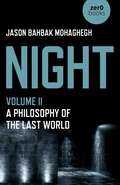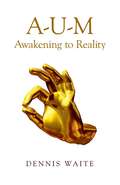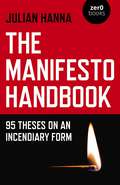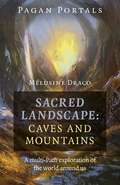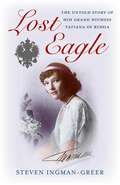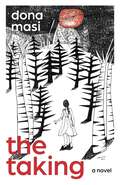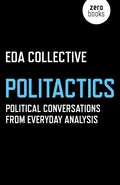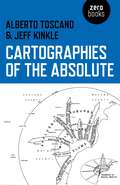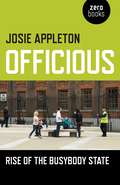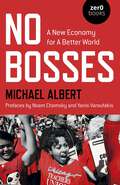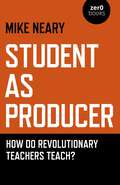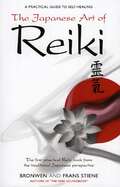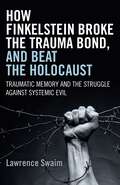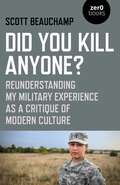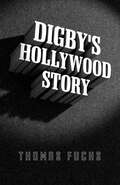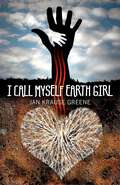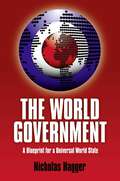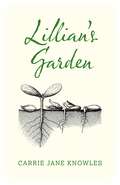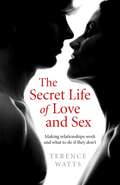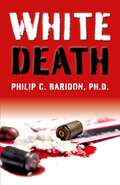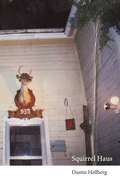- Table View
- List View
Night: A Philosophy of the Last World
by Jason Bahbak MohagheghThis book follows and expands on the boundaries of its precursor Night: A Philosophy of the After-Dark by presenting a series of new conceptual territories, figures, sources, images and imaginative possibilities. The central idea of Night is contemplated in its intricate relation to space, silence, cruelty and secrecy while also taking thought toward the futural limits of a vision of the last world.
A-U-M: Awakening to Reality
by Dennis WaiteGaudapada was one of the world&’s greatest philosophers in seventh-century India. He invokes the mystical symbol &‘AUM&’ (pronounced as &‘ohm&’) pointing to the three states of consciousness (waking, dreaming and deep sleep) and the nature of reality itself. In the text on which this book is based, he writes that the waker, dreamer and deep-sleeper are like the roles that an actor plays at various times. All three states are the result of ignorance and error. Who we really are is the fourth aspect – the actor himself. If you see or feel a &‘thing&’, then that &‘thing&’ is not &‘real.&’ So the waking world is no more real than the dream. &‘You&’ have never been born. Nothing has ever been created. Causality is a myth. Discover your true nature to be Existence-Consciousness, without limitations, undivided and infinite, prior to time and space. Incredible? Read...and be convinced by the irrefutable logic of Gaudapada.
The Manifesto Handbook: 95 Theses on an Incendiary Form
by Julian HannaThe Manifesto Handbook describes the hidden life of an undervalued genre: the conduit for declarations of principle, advertisements for new &“isms,&” and provocations in pamphlet form. Often physically slight and small in scale, the manifesto is always grand in style and ambition. A bold, charismatic genre, it has founded some of the most important and revolutionary movements in modern history, from the declaration of wars and the birth of nations to the launch of countless social, political and artistic movements worldwide. Julian Hanna provides a brief genealogy of the genre, analyses its complex speaking position, traces the material process of manifesto making from production to dissemination, unpacks its extremist underbelly, and follows the twenty-first century resurgence of the manifesto as a re-politicised and reinvigorated digital form.
Pagan Portals - Sacred Landscape: Caves and Mountains: A Multi-Path Exploration of the World Around Us
by Melusine DracoMountains form the most spectacular creations on the planet and cover such a large amount of Earth&’s landmass that they can be seen clearly from outer space. Mountains are also a reminder that humans count for nothing in the greater scheme of things. They were formed by tectonic plate upheavals of such magnitude that the fossilised remains of prehistoric sea-creatures can be found on mountains tops; in fact, many Himalayan rocks were originally sediments on the primordial Tethys Ocean floor. In this first of the Sacred Landscape series Melusine Draco looks at ways of connecting with the genii locorum that inhabit the caves and mountains of our world. A companion volume to Sacred Landscape: Groves and Forests and Sacred Landscape: Lakes and Rivers.
Lost Eagle: The Untold Story of HIH Grand Duchess Tatiana of Russia
by Steven Ingman-GreerAn epic drama of world-changing events revealed through the visionary consciousness of Tatiana, one of the four daughters of the last Russian Tsar, Nicholas II and his wife Alexandra. This is Tatiana's story, told through her diary: from idyllic childhood in the last royal family of Russia, to brutal imprisonment at the hands of the revolutionaries; from her last-minute escape and secret exile in England - for which there exists actual historical and documentary evidence - to her fulfilment in love and eventual tragic fate as she disappears from history under an assumed name. Within the storyline of history, Tatiana's passionate and impressionistic diary entries are set against the gathering storm of the revolution and the ominous indicators of the Romanov family's impending doom - and against the machinations of the British establishment which decided her fate.
The Taking: A Novel
by Dona MasiAn unnatural silence and a feeling that you are all alone in the world. . . John and his daughter, Vera, grieve the loss of Vera's mother, who mysteriously disappeared when Vera was a baby. As John struggles to raise his troubled daughter, he dismisses connections between his wife&’s disappearance and Vera&’s bizarre dreams of otherworldly creatures. But when he finds Vera unconscious, lying in a ring of scorched trees, he begins to believe that a mysterious outside force is controlling her fate and his. The Taking is a suspenseful story depicting a loving but difficult relationship between a father and daughter, amid the strange events that underlie their everyday life in a small New England town.
Politactics: Political Conversations from Everyday Analysis
by EDA CollectiveTechnology, politics and entertainment have merged to the point of confusion. Politactics, the third book from the Everyday Analysis collective, is a set of conversations about how to sift through this organized but disordered mess and create a framework which could enact change against political and corporate hegemony. An internationalist collection of essays, articles, responses and letters, the book argues that we need a &‘politactical&’ mindset in order to develop tactical and practical responses to the situations in which we are politically finding ourselves (in every sense of the phrase).
Cartographies of the Absolute
by Alberto Toscano Jeff KinkleCan capital be seen? Cartographies of the Absolute surveys the disparate answers to this question offered by artists, film-makers, writers and theorists over the past few decades. It zones in on the crises of representation that have accompanied the enduring crisis of capitalism, foregrounding the production of new visions and artefacts that wrestle with the vastness, invisibility and complexity of the abstractions that rule our lives.
Officious: Rise of the Busybody State
by Josie AppletonIn Anglo-Saxon countries there is a new and distinctive form of state: the busybody state. This state is defined by an attachment to bureaucratic proceedures for their own sake: the rule for the sake of a rule; the form for the sake of a form. Its insignias are the badge, the policy, the code and the proceedure. The logic of the regulation is neither to represent an elite class interest, nor to serve the public, nor even to organise social relations with the greatest efficiency as with classic bureaucracy, but rather to represent regulation itself. This book analyses the logic of the busybody state, explains its origins, and calls for a popular alliance defending the free realm of civil society.
No Bosses: A New Economy for a Better World
by Michael AlbertProviding hope and direction to sustain commitment on the path to change, No Bosses is about winning a new world. Life under capitalism. Rampant debilitating denial for the many next to vile enrichment of the few. Material deprivation, denial, and denigration. Dignity defiled. Michael Albert's book No Bosses advocates for the conception and then organization of a new economy. The vision offered is called participatory economics. It elevates self-management, equity, solidarity, diversity, and sustainability. It eliminates elitist, arrogant, dismissive, authoritarian, exploitation, competition, and homogenization. No Bosses proposes a built and natural productive commons, self-management by all who work, income for how long, how hard, and the onerousness of conditions of socially valued work, jobs that give all economic actors comparable means and inclination to participate in decisions that affect them, and a process called participatory planning in which caring behavior and solidarity are the currency of collective and individual success.
Student as Producer: How do Revolutionary Teachers Teach?
by Mike NearyStudent as Producer is set between the student protests and urban riots that erupted in England in 2010-2011 and the 2017 General Election, during which students and young people played a significant role by protesting the politics of austerity and by supporting the politics of Corbynism. This revolutionary curriculum is framed around unlearning the law of labor and the institutions through which the law of labor is enforced, including the capitalist university which seeks growth and expansion for the sake of growth, neglecting the needs of students in favor of the needs of the capitalist state.Through thought experiments and reference to the work of the Soviet legal theorist, Evgeny Pashukanis, Student as Producer searches for solutions to how cooperatives might be brought about by a sense of common purpose and social defense. Mike Neary grounds his answers in a version of Marx's social theory known as 'a new reading of Marx', as advanced by authors such as Werner Bonefeld and Moishe Postone. The theory is applied to various aspects of pedagogy, criminology, and political sociology to create a curricula for revolutionary teaching that will aid activists who are seeking ways in which to engage critically with higher education.
Japanese Art Of Reiki
by StieneReiki techniques originated in Japan, in an intensely spiritual period of that country's history. This fully-illustrated book traces the system's evolution from a spiritual self-development system to a direct hands-on practice. The journey moves from Japan to the USA, out to the world, and back to Japan. Focussing on the basic elements in their historical context, this guide contains beautifully grounded information that captures a unique sense of the system's traditional Japanese roots. The clarity and accessibility of the teachings in the book redefine and strengthen the concept of Reiki as it is practised today.
The Senator's Darkest Days
by Joan E. Histon40AD and despite the threat of bloodshed, Senator Vivius Marcianus travels to Jerusalem to investigate the delay in erecting the Emperor's statue in the temple. Failure is not an option. When Vivius is wounded and imprisoned, it is left to Dorio to rescue his heavily pregnant sister and her children and set about proving Vivius's innocence. The thrilling sequel to The Senator's Assignment
How Finkelstein Broke the Trauma Bond, and Beat the Holocaust: Traumatic Memory And The Struggle Against Systemic Evil
by Lawrence SwaimFollowing on from the first two books in his 'Genesis Trilogy', Lawrence Swaim tells the amazing stories of people who broke the trauma bond, and created new lives for themselves. Including, among others: Norman Finkelstein (whose parents were both Holocaust survivors) who broke free from the inter-generational trauma in his family system by exposing extensive corruption in his community--and in American society--and by working for social justice in the Middle East; Eric Lomax, a former British soldier in the far east, who broke free from his haunting traumatic memories by meeting and reconciling with the Japanese man who had tortured him fifty years before, with the help of his brave and insightful wife; Gerry Adams who, together with his IRA and Sinn Fein comrades, broke free of the trauma of Northern Ireland's civil war, finally redeeming himself by questioning some of his own assumptions and then dedicating himself to achieving peace in the Good Friday (Peace) Agreement of 1998. This is a definitive book about personal struggle against traumatic memory, but also about how trauma bonding operates in society. It is the author's belief that unresolved feelings of psychological trauma are the wheelhouse of systemic evil, whether of the dictator, the demagogue or the criminal psychopath. It is by manipulating shared traumatic memories that tyrants control people, and get them to do terrible things they would never otherwise do.
The Coronation of King Charles: The Triumph of Universal Harmony
by Nicholas HaggerIn King Charles the Wise, Nicholas Hagger celebrated Prince Charles&’s humanitarian vision and foresaw the birth of a united world. In The Coronation of King Charles he celebrates the coming Carolingian Age. The hope is that all the divisions within the UK and problems of humankind will be resolved under a new democratic World State working to abolish war, enforce disarmament, combat famine, disease and poverty, and solve the world&’s environmental and ecological problems of climate change and global warming; and that King Charles, Head of a Commonwealth of 53 nation-states, will work to bring his humanitarian vision to all the world&’s nations. Following the tradition of Ben Jonson&’s 17th-century court masques in verse and of his own masques The Dream of Europa and King Charles the Wise, which incorporate the blend of mythology and history and five sections (prologue, antimasque, masque, revels and epilogue) found in all masques.Hagger sets the third masque in his trilogy in London's Banqueting House, where masques were performed before James I. This coronation masque contains three pageant entertainments that are viewed by King Charles before his coronation and contrast the disorder and political chaos before his reign with the order and harmony of his new Carolingian Age. His philosopher-King&’s concern to benefit the lot of all humankind is applauded by the Universalist God of the One who assumes protean forms - the gods of all faiths including Biblical Israel&’s Yahweh and Olympian Zeus - and cares for all creation, and watches over him. King Charles, co-author of Harmony, is shown as presiding over what promises to be an Age of Universal Harmony.
Going Nowhere, Slow: The Aesthetics and Politics of Depression
by Mikkel Krause FrantzenUsing examples from art and literature, Frantzen explores the social, political and economic implications of both real and imagined depression. Is feeling blue a symptom of the death of progress? Was the suicide of David Foster Wallace a proverbial canary in a coal mine? Margaret Thatcher once declared that there is no alternative to the social order that we now reside within. Have we accepted her slogan as a fact, and is that why so many are on Prozac and other anti-depressants? Frantzen examines the works of Michel Houellebecq, Claire Fontaine and David Foster Wallace as he seeks out an answer and a way to formulate a new future oriented left movement.
Did You Kill Anyone?: Reunderstanding My Military Experience as a Critique of Modern Culture
by Scott BeauchampMost American soldiers in Iraq had a deep, thick plastic box called a guerrilla box which usually sat at the end of their cot. Soldiers would keep all kinds of things in their box. Weapon cleaning kits. Extra equipment. Blankets and pillows from home. Footballs. Protein powder. Mine was full of books. These are not confessions. Nor are they essays. Nothing is off the table in Did You Kill Anyone?, a hybrid compendium of thoughts and observations whose narrative thrust is propelled and shaped by the inquiry itself. Drawing from and elaborating on years of the author&’s work on the peripheries of this subject, published in such outlets as The Paris Review, The Atlantic, Rolling Stone, and The American Conservative, Did You Kill Anyone? asks a question that is rarely, if ever, discussed publicly: &‘why do soldiers miss war?&’. With the intimacy of a memoir and the force of a critical analysis, Scott Beauchamp gives his daring, counterintuitive take, interrogating the frivolous conformity of our increasingly inhuman(e) culture.
Digby's Hollywood Story
by Thomas FuchsA studio cop, an aspiring actress who uses what she&’s got to get what she wants, a cross-dressing action star, a mysterious death – all are elements in this novella set in 1940s Hollywood... but the real subject of Digby&’s Hollywood Story is story-telling itself, an examination of our need to make sense of the world by casting the chaos of life into the form of narrative.
I Call Myself Earth Girl
by Jan Krause GreeneAll Gloria ever wanted was a normal life. Instead she is having recurring dreams about Earth Girl, who recounts the story of her abduction and rape. When Gloria discovers that she is pregnant, despite her husband's long absence, she begins to question her sanity. Could she really be carrying Earth Girl's baby? Can she save her marriage while unraveling the mystery that ties her to the past and future and to a love that endures beyond time?
World Government: A Blueprint For A Universal World State
by Nicholas HaggerThe dream of world government is becoming a reality. A Universalist blueprint for a philanthropic, democratic supranational World State.
Lillian's Garden
by Carrie KnowlesJust when Helen thinks she can take charge of her life, a devil-hunting itinerant preacher upsets the delicate balance she has managed in a family locked in secrets and headed for trouble. When Helen breaks down, her husband, Richard, angry and ashamed, commits her to a mental institution without telling their children where their mother has gone. Lillian's Garden is a novel about failure and finding redemption through learning how to ask for what you want and accepting what love has given you.
The Secret Life of Love and Sex: Making relationships work and what to do if they don't
by Terence WattsJust as a relationship needs love and sex to nurture it, so there are times when lies and secrets are necessary too. Some people seem to be able to get the balance just right without really trying very hard at all, while others never do seem to &‘get it&’. Yet it&’s an easy trick to learn and here&’s your chance, because all these things and lots more are covered in vivid detail: Why personality matters and how to work it out; Understanding the amazing differences between men and women; How to get off to a good start; How to get back on track when things go wrong; Dealing with sexual difficulties - easily; Handling a break up by taking charge and ending it elegantly. Sharing your life with another is not an easy task - in fact the surprise is not so much that it often doesn&’t work but that it can be spectacularly successful! From page one onwards, you will begin to gain a stunning insight into how you can find and keep the love you&’ve always wanted. Written by an expert in relationships and human nature, this book can set you on your way to true happiness.
White Death
by Philip C. BaridonIn 1969 city cop Jake Stone goes deep undercover, serving time in a Florida prison to meet a close friend of cartel boss Marcus Sterling. Working with a seductive, female FBI agent, Jake flies cocaine for the Barranquilla Cartel. But how long before his cover is blown?
Pagan Portals - Rhiannon: Divine Queen of the Celtic Britons
by Jhenah TelyndruTo truly know Rhiannon, we must excavate the layers of her myth, decode the meaning of her symbols, and seek to restore the significance of her very name. Although she has a mythology around her, and has many modern-day devotees, nowhere in ancient lore has she been identified as a Goddess. We have no known cult centers or devotional altars dedicated to Rhiannon. How then do we approach this revered Lady? How can we best know her as Goddess? We need but call to her, and ask for what we need. Be it her bag of plenty, the soul-healing song of her birds, or the empowerment of the sovereignty she holds, when you call to Rhiannon, the Divine Queen of the Britons, know that she will stop… and know that she will answer your call.
Squirrel Haus
by Dustin HellbergSet in 2003, Squirrel Haus chronicles the fall and the further fall of two friends living in the eponymous house in the Iowa Midwest, a place most people imagine is bereft of craziness or fun. It is not so. In literary fashion, the book loosely parallels the Iraq War and the Epic tradition, as the protagonists fall victim - wittingly at times - to the American culture of lies and violence and excess...
